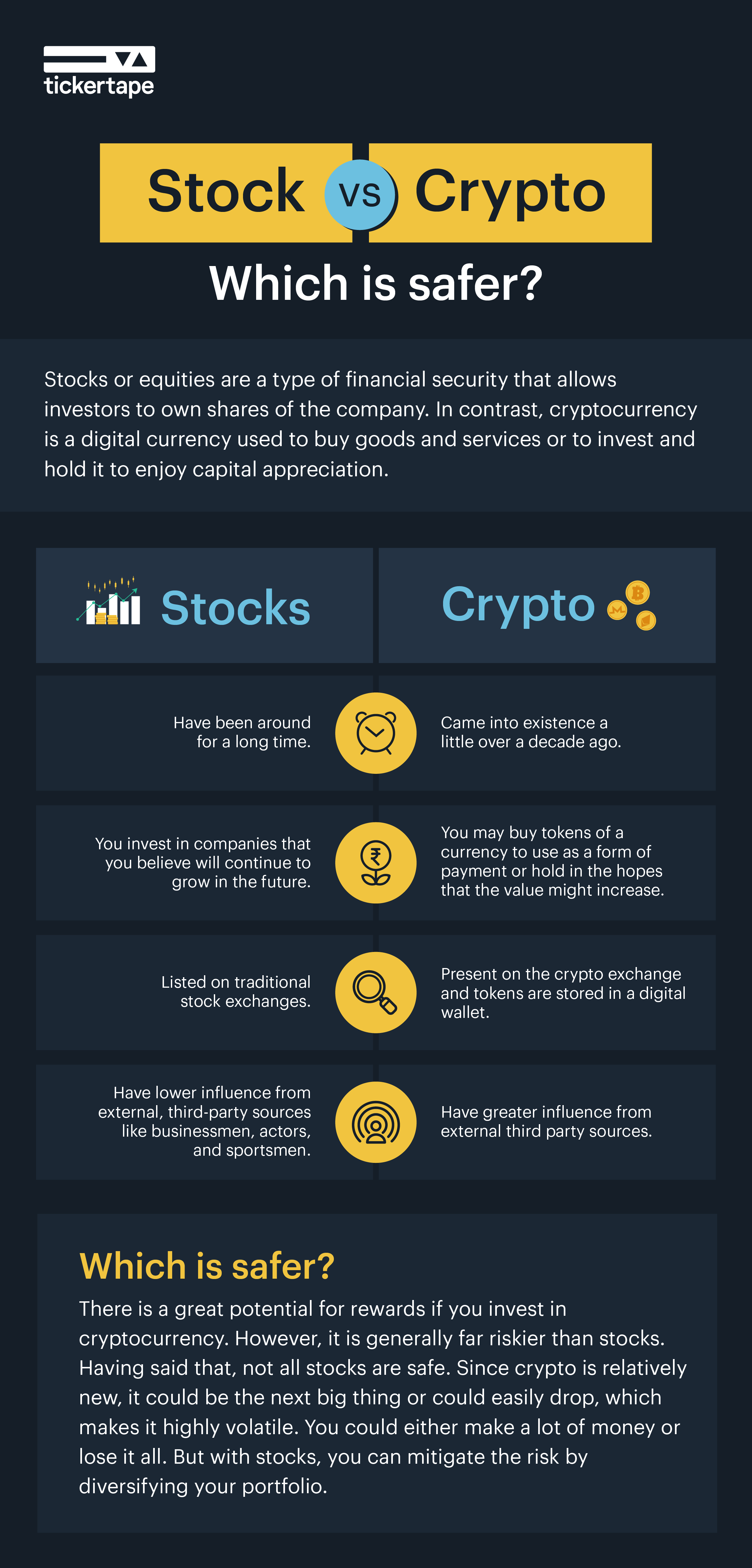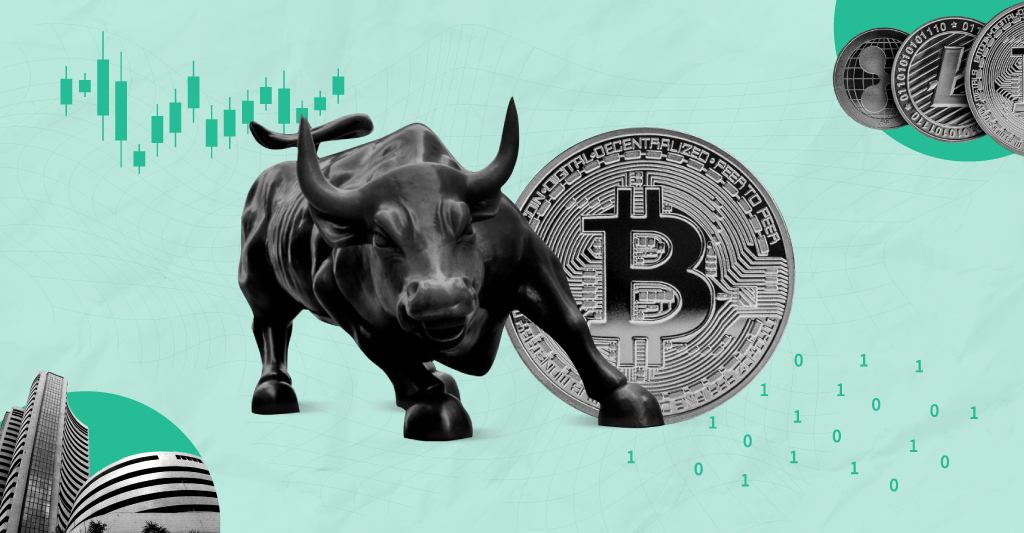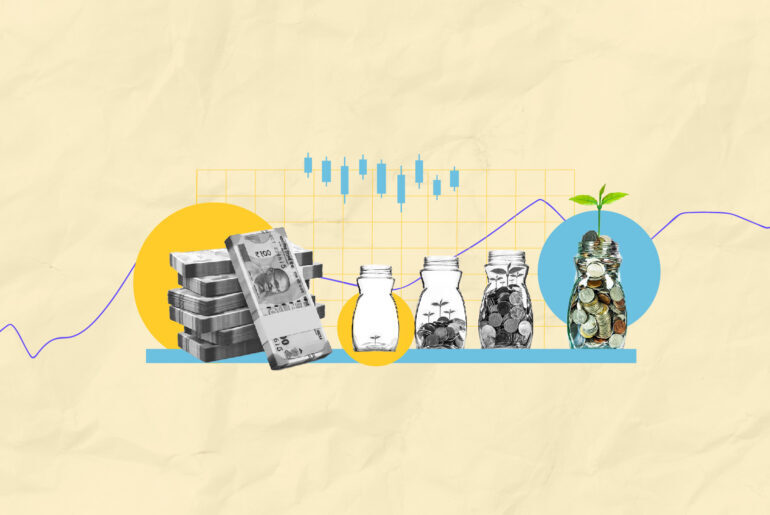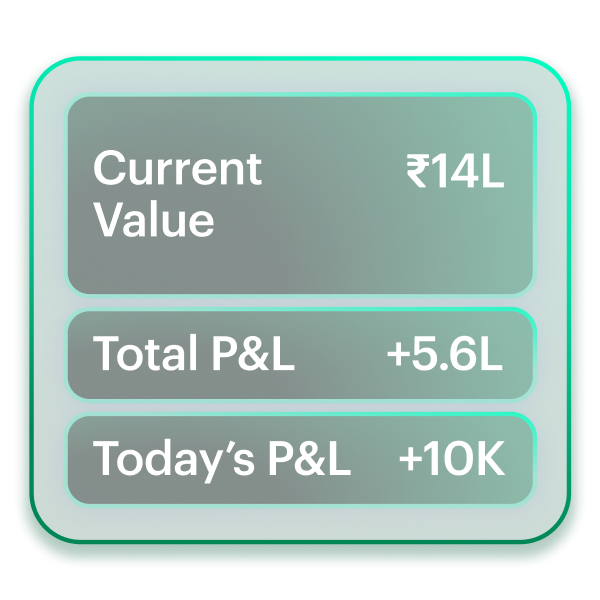Last Updated on May 24, 2022 by Anjali Chourasiya
If not for the uncertain legal status of cryptocurrency in India, would you have or have you already invested in the digital asset yet? Or do you think it is too risky and extremely sensitive to how the big investors engage with it? If yes, doesn’t the same apply to stocks as well? Well, if both are risky, which one of them is safer? Let’s find out.
Everyone is talking about cryptocurrencies. They are literally all over the news. And the one thing you can’t help but notice is its extremely volatile nature. But stocks are volatile too. In fact, they have the power of crashing the entire financial market. Think the Great Depression, Harshad Mehta Scam, and Lehman Brothers’ crisis.
So, if both cryptocurrency and stocks can be turbulent, which one would be a better investment for you?
Let’s first understand what shares and cryptocurrencies are.
Table of Contents
What are stocks?
Although there are various types of shares, stocks are synonymous with equity shares. Stock is a portion of a company’s capital. Hence, it gives the shareholder part-ownership of the entity, voting rights, and dividends at the discretion of the company.
What is a cryptocurrency?
A form of digital or virtual currency, crypto is secured by cryptography. You can buy units of them called tokens and use them as a medium of exchange to buy or sell goods and services. Unlike a traditional currency, crypto has no issuing agency but works on blockchain technology.
Blockchain is a decentralized technology managed by a network of computers, which makes it possible for anyone with knowledge of programming to mine cryptos. They are known to be transparent and secure.
How are stocks and cryptocurrency different?
Both are types of investments. However:
1. Cryptos are relatively newer than stocks. The famous crypto Bitcoin was only introduced in 2009.
2. In the case of crypto, you buy tokens in exchange for fiat currency. You can either use them as a form of payment or simply hold them expecting an increase in their value. In the case of equity stocks, you buy a share in the company and hence are entitled to part-ownership and potential profits. You hold the shares in hopes of the price increasing and receipt of dividend if any.
3. Unlike a stock that is traded on a traditional stock exchange and stored in a Demat account, cryptocurrencies can only be bought and sold on a crypto exchange and stored in a digital wallet.

Are stocks safer than crypto?
Let us look at a few factors that will help you decide which of the two options is safer.
1. Risk and return
As per Coinmarketcap.com, Nifty had zoomed 73% in FY 2021 until 19 March. Bitcoin, on the other hand, had rallied more than 840%. Although cryptos have generated higher returns than stocks, the associated risk is also higher. Remember, the higher the risk, the higher would the returns be and vice versa. That is to say, a cryptocurrency is highly risky compared to stocks.
2. Predictability
Because crypto is relatively novel, predicting its movement and response to the market is not known well. While the stock market has exhibited its sensitivity to the economy, government policies, and investor sentiment, the same is not known for cryptocurrencies. True, Bitcoin and Dogecoin have been reactive to Elon Musk’s word. But that is not enough to draw a genuine conclusion.
3. Future
Another factor to consider is that stocks have been around for decades now. Although volatile, masses are familiar with the concept. In contrast, cryptocurrency is a relatively new investment. And its future is uncertain. It could be either be a game-changer for investors or burst like a bubble. In terms of money, you could either make a lot or lose a lot.
4. Security
A stock market is regulated by government agencies. In India, SEBI regulates the markets. It intervenes when necessary—for instance, when stock prices skyrocket without a plausible reason—and demands investigation. The watchdog also penalises the guilty parties. Ergo, the chances of manipulation are less compared to cryptos. Since these are decentralised, cryptos are unregulated and hence prone to fraud.
That said, it is important to study and understand any and every investment product before parking your money in it. That is to say, having a high tolerance for risk is not enough. Besides, diversifying your portfolio is a must to minimise your loss. Especially, when you are looking to invest in a highly volatile instrument like a cryptocurrency.
Now, the answer to which is the best investment is subjective. You are the best judge of your understanding of stocks, cryptos, and your risk tolerance. Think well and research thoroughly before betting your funds on any investment.
FAQs
1. Is cryptocurrency legal?
It depends on the country in which you reside and transact with. Cryptocurrency in India are not illegal but lack regulation.
2. What are the different types of shares?
Shares are broadly classified into two types:
3. Are all shareholders owners of a company?
Both equity and preference shareholders get part-ownership in a company. However, the scope of rights that they are entitled to are different.
4. What is blockchain?
Blockchain is an electronic ledger that can’t be meddled with. It is similar to an accounting ledger.
5. Why is blockchain considered safe?
Since blockchain doesn’t require an intermediary, it alleviates the risk of fraud and corruption. The very feature makes blockchain transactions fast and cost-effective.
6. How does blockchain work?
Blockchain technology is based on a network. It connects millions of computers that can host encrypted copies of the records. Ergo, it has not one record keeper but millions of them, called nodes.
7. Is cryptocurrency different from blockchain?
Yes, blockchain is the technology based on which cryptocurrencies are mined.
- Top Large Cap Funds (2025): Best Blue Chip Mutual Funds - Apr 15, 2025
- List of Best Index Funds in India 2025 - Apr 15, 2025
- List of High Beta Stocks in India: Volatile Shares on NSE - Apr 11, 2025




